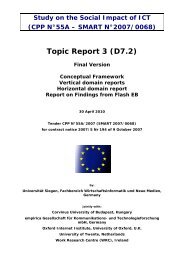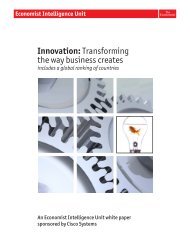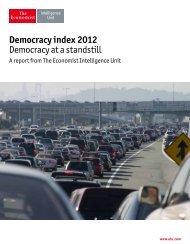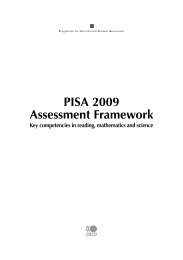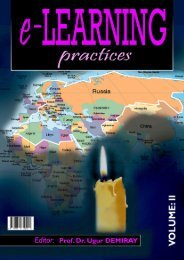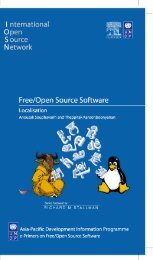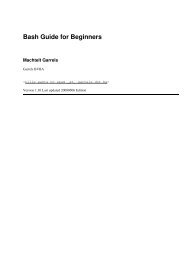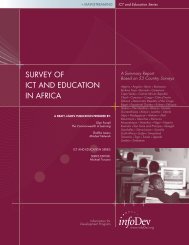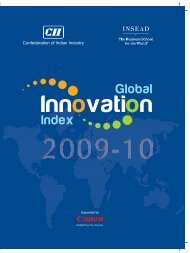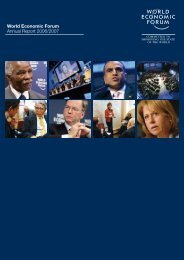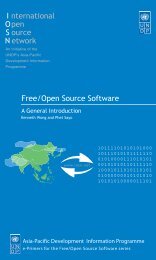1 PUBLIC POLICY FOR A KNOWLEDGE ECONOMY Joseph E ...
1 PUBLIC POLICY FOR A KNOWLEDGE ECONOMY Joseph E ...
1 PUBLIC POLICY FOR A KNOWLEDGE ECONOMY Joseph E ...
Create successful ePaper yourself
Turn your PDF publications into a flip-book with our unique Google optimized e-Paper software.
<strong>PUBLIC</strong> <strong>POLICY</strong> <strong>FOR</strong> A <strong>KNOWLEDGE</strong> <strong>ECONOMY</strong><br />
<strong>Joseph</strong> E. Stiglitz<br />
Senior Vice President and Chief Economist<br />
The World Bank<br />
Department for Trade and Industry<br />
and<br />
Center for Economic Policy Research<br />
London, U.K.<br />
January 27, 1999<br />
INTRODUCTION<br />
<strong>KNOWLEDGE</strong> AND DEVELOPMENT<br />
Development Knowledge and the World Bank<br />
The Knowledge Culture<br />
Changing Ways of Thinking<br />
Tacit Knowledge and Local Adaptation<br />
Active Learning and Intrinsic Motivation<br />
BASIC ANALYTICS OF THE <strong>KNOWLEDGE</strong> <strong>ECONOMY</strong><br />
The Scarcity-Defying Characteristics of Ideas<br />
Intellectual Property Rights<br />
Not Ordinary Property Rights<br />
Externalities<br />
Competition<br />
Organizational Dimensions of Knowledge and Information<br />
Knowledge Transactions within Firms<br />
Openness and Knowledge Transfer<br />
Experimentation<br />
The Marketplace of Ideas: Decentralization, competition, and experimentation<br />
Pluralism in Project Selection<br />
Towards Robustness: Some Implications of Imperfect Knowledge<br />
The importance of recognizing human fallibilities and imperfections of information<br />
The failure of central planning: an example<br />
1
Decentralization and Participation within firms<br />
Openness in the Political Process<br />
<strong>PUBLIC</strong> <strong>POLICY</strong> <strong>FOR</strong> A <strong>KNOWLEDGE</strong> <strong>ECONOMY</strong><br />
Some Recent U.S. Policies<br />
Increasing Capacity<br />
Industrial Policy and the Support of Research<br />
Competition<br />
Financial Markets<br />
Tax Policy<br />
CONCLUSION<br />
REFERENCES<br />
2
INTRODUCTION<br />
The past several centuries have witnessed several fundamental economic<br />
transformations, and each of these economic transformations has had fundamental<br />
implications for the nature of society.<br />
The industrial revolution laid the foundation of the transformation of the economy<br />
from agriculture to industry; with it, not only did living standards rise, but also the location<br />
of life changed, from rural communities to metropolitan megalopolises. The scientific<br />
revolution of the past century has resulted in the systematization of change itself: the very<br />
process of producing new innovations has been altered, from isolated and independent<br />
inventors like Thomas Edison to huge research laboratories. Knowledge and information<br />
is being produced today like cars and steel were produced a hundred years ago. Those,<br />
like Bill Gates, who know how to produce knowledge and information better than others<br />
reap the rewards, just as those who knew how to produce cars and steel a hundred years<br />
ago became the magnates of that era.<br />
In what ways are the laws that govern the new Economies differ from that of<br />
the old To be sure, we still face the economics of scarcity. But just as the<br />
importance of land in production changed dramatically as the economy moved from<br />
agriculture to industry, so too does the movement to a knowledge economy<br />
necessitates a rethinking of economic fundamentals. Knowledge is different from<br />
other goods: it has many of the central properties of a public good, indeed of a global<br />
public good. 1 While government has a key role in protecting all property rights, its<br />
role in intellectual property rights is far more complicated: the appropriate definition of<br />
these rights is not even obvious. And in the knowledge economy, the dangers of a<br />
monopolization are perhaps even greater than in industrial economies. These are but<br />
three examples of the ways in which the role of government in the knowledge<br />
economy may differ markedly from that in the industrial economy with which we have<br />
become familiar over the past century.<br />
1 See Stiglitz (1995, 1998).<br />
1
I want, however, to broader the discussion beyond these technical economic issues<br />
in three directions: to the role of knowledge in development, to the culture of the<br />
knowledge economy and to some of the implications of the new economy for democratic<br />
processes.<br />
I approach the problem of the knowledge economy from three perspectives: from<br />
that of a theorist, who has spent almost three decades thinking about the economics of<br />
information and knowledge; as Chairman of the Council of Economic Advisers, where we<br />
struggled with many of the same questions that are the focus of concern of your recent<br />
White Paper, 2 and, most recently, as Chief Economist at the World Bank. In hope to<br />
weave these three perspectives into my remarks this morning. I shall begin by looking at<br />
the problem from my current vantage point.<br />
<strong>KNOWLEDGE</strong> AND DEVELOPMENT<br />
Development Knowledge and the World Bank<br />
The World Bank is concerned with promoting growth and reducing poverty in the<br />
developing world. Our most recent World Development Report (1998/99) was devoted to<br />
the theme of Knowledge for Development— and I am of course glad to see it cited in the<br />
U.K. White Paper. For many years the received wisdom in economic development<br />
focused on building infrastructure and factories. Government officials could proudly show<br />
these constructions to visiting economists as the tangible evidence of development. The<br />
focus was on the “weighty economy”—if we use the metaphor of knowledge as the basis<br />
for the “weightless economy.” We now see this strategy as being seriously incomplete—<br />
indeed as only focusing on the “easy part” of development.<br />
Today the World Bank has shifted much of its emphasis to the intangibles of<br />
knowledge, institutions, and culture in an attempt to forge a more comprehensive New<br />
Development Framework for our work. 3 We want, for instance, to be a Knowledge<br />
2 Department For Trade and Industry (1998a).<br />
3 See Stiglitz (1998b).<br />
2
Bank 4 , not just a bank for infrastructure finance. We now see economic development as<br />
less like the construction business and more like education in the broad and comprehensive<br />
sense that covers knowledge, institutions, and culture.<br />
The shift in focus was motivated in part by the experience of the most successful<br />
countries— and the failures of many of our efforts around the world. By most accounts,<br />
the accumulation of capital could explain only a fraction of the increases in per capita<br />
income in the countries in East Asia. Their miraculous growth is largely attributed to<br />
closing the knowledge gap, the gap between the more developed and less developed<br />
countries in the knowledge about how to transform inputs into outputs. To be sure, some<br />
of this closing of the knowledge gap was itself “purchased,” the result of investments in<br />
capital which embodied more advanced technologies.<br />
The Knowledge Culture<br />
Changing Ways of Thinking<br />
But more than just knowledge was acquired: there was a change in ways of<br />
thinking. It is hard to define this change: an acceptance of change, a recognition that the<br />
poverty in which they had been mired for centuries was neither inevitable nor necessary,<br />
and, perhaps most important, the appreciation of the centrality of knowledge and<br />
education in general and the science and technology in particular. To be sure, even in the<br />
most advanced societies, the scientific approach, as much as it has benefited all of us,<br />
remains concentrated within relatively small circles— a fact that those of us who moved<br />
from academia to government saw all too clearly. The process of development can be<br />
seen as extending the reach of these basic ways of thinking, making them more pervasive<br />
in every corner of life.<br />
I have often found that a study of the development process highlights aspects of<br />
the more developed industrial countries' societies and economies. So too here, for it<br />
brings home forcefully the change in culture that must accompany success in the new<br />
knowledge economy. I have seen this vividly, as I have moved from teaching at<br />
4 The concept of the Knowledge Bank was introduced in Wolfensohn’s address to the Annual meetings in<br />
1996. See Wolfensohn (1996).<br />
3
Princeton, on the outskirts of New York, where the culture of Wall Street cast its long<br />
shadow, to teaching at Stanford, and then on to Washington. One really felt the<br />
entrepreneurial spirit at Stanford. In the corridors and restaurants, there was constant talk<br />
of new enterprises, translating the advances in ideas into new products and new<br />
businesses. Venture capital firms sought out these new opportunities, providing not just<br />
with capital, but with managerial know-how. The focus was on creativity and wealth<br />
creation, not on the rearrangements of the use of already existing assets and corporations,<br />
the take-overs and mergers, the corporate restructurings that were so much the center of<br />
attention on Wall Street. There is no prescription for how a country creates such a<br />
culture, just as there is no prescription for how a corporation can create such a culture.<br />
But government does have a role— a role in education, in encouraging the kind of<br />
creativity and risk taking that the scientific entrepreneurship requires, in creating the<br />
institutions that facilitate ideas being brought into fruition, and a regulatory and tax<br />
environment that rewards this kind of activity. In the discussion below, I shall focus more<br />
narrowly on the technical, economic aspects of government policies, but I cannot<br />
emphasize enough my belief that the full benefits of these reforms will only be felt if there<br />
is a more fundamental change in culture.<br />
Before moving on to a fuller discussion of these technical issues, let me spend a<br />
few more moments dwelling on the central role of institutional and cultural change in the<br />
creation of a knowledge economy, focusing on our experiences in transferring knowledge<br />
to less developed countries.<br />
Tacit Knowledge and Local Adaptation<br />
The Analytical Background Report 5 recognizes the importance of non-codified or<br />
tacit knowledge and the difficulties in transferring it. Indeed, it is precisely the difficulties<br />
in transferring a company’s tacit knowledge base embedded in its staff that can be a basis<br />
for the company’s competitive advantage. But viewed the other way around, this means<br />
that transferring tacit knowledge is a substantial obstacle to those of us in the economic<br />
5 Department for Trade and Industry (1998b).<br />
4
development business who view knowledge as Bacon viewed money–as a “muck” to be<br />
spread as widely as possible.<br />
Take technology transfer as an example. The technical manuals, blueprints, and<br />
instruction books are the codified technical knowledge that could be seen as only the tip of<br />
the iceberg. The codified technical information assumes a whole background of<br />
contextual knowledge and practices that might be very incomplete in a developing<br />
country. Implementing a new technology in a rather different environment is itself a<br />
creative act, not just a copied behavior. Getting a complex technical system to function<br />
near its norms and repairing it when it malfunctions both draw upon a slowly accumulated<br />
reservoir of tacit knowledge that cannot be easily transferred or “downloaded” to a<br />
developing country.<br />
If all this is true for relatively cut-and-dry technical knowledge, one can imagine<br />
the problems in “transferring” the economic institutions of a private property market<br />
economy to developing countries. The word “transferring” must even be enclosed in<br />
raised-eyebrow quotes to signify the problematic nature of this venture. Yet we have<br />
come to believe that a proper institutional framework is key to development.<br />
What part of an institution is only particular to, say, an Anglo-American<br />
environment, and what part is more universal To a boy growing up in the American<br />
Midwest with baseball, football, and basketball, it is a rude shock to find out that most<br />
other countries do not play these ballgames and that most countries even play a game<br />
where the ball cannot be touched with the hands! America has clearly not been successful<br />
in teaching the world the proper way to play “football.”<br />
But as economists we try to discern more universal principles amidst the “buzzing<br />
and booming confusion” of local economic practices, and we try to apply these principles<br />
to reform economic institutions. If this is to be more than a quixotic venture to “teach the<br />
world the proper way to play football” then we must consider the subtleties of institutional<br />
knowledge transfer. Economic agents act in a whole matrix of economic, political, and<br />
cultural factors, many of which are tacit factors not apparent to the “visiting economist.”<br />
A quick transplant of a “textbook model” will very likely not take root in the local soil.<br />
Instead a longer process of transplanting or grafting is required. That process cannot be<br />
5
engineered from Washington. The local economic agents and agencies— who have the<br />
local tacit knowledge— must take charge of the process of recreating the more universal<br />
institutional schema within the local matrix of economic, political, and cultural factors. It<br />
is this complex interplay of international and local agencies that is key to the Bank’s vision<br />
of knowledge-based development, a vision that moves well beyond the idea of universal<br />
recipes developed in Washington about “how to play football.”<br />
Active Learning and Intrinsic Motivation<br />
Development is about the transformation of societies which ultimately involves<br />
people changing how they think. External agencies cannot force people to change how<br />
they think or what they believe. 6 People can be forced to adopt certain behaviors and to<br />
utter certain words, but they cannot be forced to change their hearts or minds. That, they<br />
can only do themselves.<br />
In industry, the shift towards a knowledge-based economy involves a shift in<br />
organization away from top-down hierarchical structures to flatter structures such as<br />
networks of semi-autonomous teams. Tayloristic vertical structures were designed to<br />
enforce and coordinate certain physical behaviors while knowledge-based work<br />
organization involves greater recognition of the autonomy and self-direction of the mind.<br />
Knowledge is best acquired not by passive rote memorization but by the active<br />
involvement of the learner. Learning is by doing, not by watching or memorizing. These<br />
activist principles were embodied, for example, in John Dewey’s pragmatic philosophy of<br />
education. 7<br />
To foster the active involvement of the learner, the motivation should at best be<br />
intrinsic to the activity, not a superadded carrot or stick. While external incentives can<br />
6 "As little as another can go to hell or heaven for me, so little can he believe or disbelieve for me; and as<br />
little as he can open or shut heaven or hell for me, so little can he drive me to faith or unbelief." See<br />
Luther 1942 (1523). This insight was basic to the liberty of conscience and the attitudes of religious<br />
tolerance fostered in Europe by the Reformation.<br />
7 Perhaps the foremost example of a school system based on Deweyian principles was the system in my<br />
hometown of Gary, Indiana established in the early twentieth century see Bourne (1970). The effects of<br />
these reforms were still evident when Paul Samuelson went through the system to be followed by myself<br />
years later.<br />
6
modify short-term behavior, they usually will only temporarily override rather than change<br />
the internal system of motivation. When the extrinsic incentives are removed, behavior<br />
reverts to the previous motives. In the management literature, the importance of intrinsic<br />
motivation has been emphasized by W. Edwards Deming. 8 An effective quality system is<br />
not based on external monitoring buttressed by quality bonuses but on the intrinsic ethos<br />
of producing quality for its own sake based on the pride and self-esteem of the workers.<br />
All of these principles are equally fundamental for the knowledge-based<br />
transformation of a developing country as they are for a knowledge-based company.<br />
“Best practices” that are imposed on a country by conditionalities (“carrots and sticks”)<br />
will not produce lasting change. It will undermine people’s incentives to develop their<br />
own capacities and weaken their confidence in using their own intelligence. The external<br />
development agency, instead of acting as a catalyst or midwife to empower change, will<br />
only short-circuit people’s learning activities and reinforce their impotence. The external<br />
incentives may temporarily overpower the springs of action that are native to the<br />
institutional matrix of the country but that will probably not induce any lasting institutional<br />
reforms.<br />
Participation in the vital activities of a developing society, like shopfloor<br />
participation in a company, is necessary to foster a lasting transformation. Active<br />
involvement brings commitment to the lessons being learned and ownership of the results.<br />
Participation and involvement is not just a matter for government officials or managers; it<br />
needs to reach deeper to include those who are often excluded and who are key to the<br />
strengthening of social and organizational capital. 9 Outside experts can encourage<br />
“ownership” of “best policies” through persuasion, but the degree of ownership is likely to<br />
be much greater if those who must carry out the policies are actively involved in the<br />
process of shaping and adapting, if not reinventing, these policies in the country (or<br />
company) itself.<br />
8 See Deming (1982, 1994).<br />
9 See Wolfensohn (1997) for a discussion of the importance of inclusion in the development process.<br />
7
BASIC ANALYTICS OF THE <strong>KNOWLEDGE</strong> <strong>ECONOMY</strong><br />
It should by now by clear that success in the knowledge economy requires a<br />
change in culture. But I want to move away from this broader perspective, viewing the<br />
knowledge economy within the framework of the economists’ more traditional tool-kit. I<br />
want to argue that there are some fundamental ways in which knowledge is different from<br />
ordinary commodities, differences which have fundamental implications for the way a<br />
knowledge economy must be organized, and accordingly, fundamental implications for<br />
public policy.<br />
The Scarcity-Defying Characteristics of Ideas<br />
First, and perhaps most fundamentally, is the fact alluded to earlier— knowledge is<br />
a public good. Thomas Jefferson described the non-rivalrousness of knowledge and<br />
information in the following way: "He who receives an idea from me, receives instruction<br />
himself without lessening mine; as he who lights his taper at mine, receives light without<br />
darkening me." 10 The properties of dynamic processes driven by knowledge seem to<br />
ultimately derive from the scarcity-defying expansiveness or non-rivalrous aspect of<br />
knowledge. Once knowledge is discovered and made public, there is essentially zero<br />
marginal cost to adding more users<br />
It is useful to differentiate conceptually the pure non-rivalrousness of knowledge<br />
from the low cost of dissemination. The information revolution results in part from the<br />
great strides made in modern technology in reducing the costs of processing and<br />
disseminating information. But any material embodiment or encoding of information is<br />
still strictly speaking rivalrous. As an overdue notice from a library attests, two people in<br />
different places cannot use the same book at the same time. And as the waiting time to<br />
download from the Internet attests, electronic packets on telephone networks are still<br />
rivalrous and can lead to congestion effects. It is only immaterial ("disembodied")<br />
knowledge, information, ideas, concepts, functions, and other abstract objects of thought<br />
that are purely non-rivalrous. It is the process of embodying knowledge in people<br />
(learning) and things (application) that is costly in time and resources.<br />
10 See Jefferson (1984).<br />
8
Intellectual Property Rights<br />
Not Ordinary Property Rights<br />
A pure public good is a good that is non-rivalrous and also cannot be excluded<br />
from certain users. Knowledge is to some extent excludible so it might be considered an<br />
impure public good. But efficiency in use requires that there be no charge; yet with no<br />
charge, firms would have no incentive to produce knowledge. For knowledge to be a<br />
provided privately, there must be some form of ‘protection’ – knowledge cannot simply be<br />
made publicly available. In some instances, trade secrets will do. But in other instances,<br />
the broader protection of intellectual property rights is required.<br />
Too often, however, the difference between intellectual property and other forms<br />
of property rights are glossed over. Clearly, a system of government which protects my<br />
physical property from theft is necessary if I am to have any incentive to acquire such<br />
property, and there is almost universal agreement that governments should strive to have<br />
the most effective protection of physical property as possible. Reasoning by analogy,<br />
some have argued for “strong intellectual property right regimes,” failing to note the<br />
salient differences. In particular, all ideas build on the work of others, drawing upon the<br />
common pool of ideas. Indeed, the basic ideas, such as mathematical theorems (which<br />
provided, for instance, the basis for the modern computer) typically are not patentable.<br />
Strengthening intellectual property rights often means raising the price of a key ingredient<br />
into research— knowledge— and thus it is possible that an excessively “strong” intellectual<br />
property regime may actually inhibit the pace of innovation. Issues of the breadth (scope)<br />
of a patent, the standards of novelty, and even the duration pose difficult problems and<br />
trade-offs: not only between static and dynamic efficiency (a point long emphasized in the<br />
literature) but also between initiating and follow on innovations. As we move into the<br />
knowledge economy, more thought to these vital issues must be given.<br />
9
Externalities<br />
Even if knowledge is not a pure public good, there are extensive<br />
externalities (spillovers) associated with innovations. The full benefits of the transistor or<br />
the laser clearly did not accrue to those who contributed to those innovations.<br />
My predecessor as Chairman of the Council of Economic Advisors, and Stanford<br />
colleague, Mike Boskin, was often quoted as saying that he did not care whether an<br />
economy produced potato chips or computer chips. This was his quip encapsulating his<br />
strong opposition to industrial policy. But he was wrong. There may be a difference<br />
between someone who makes a better potato chip and someone who makes a better<br />
computer chip: the magnitude of the externalities, the spillovers, may be an order of<br />
magnitude greater in the latter case than in the former. I shall return to this theme later in<br />
my discussion of industrial policy and picking winners.<br />
Competition<br />
The White Paper rightly emphasizes the importance of competition for the success<br />
of the knowledge economy. I find it remarkable how some of the debates over capitalism<br />
of former days are forgotten as the world confronts new challenges. In the 1930s, there<br />
was a great deal of worry about monopoly capitalism; the concern was that the new<br />
industrial technologies required sufficiently large scales of production for efficiency that<br />
there would be relatively few firms in any economy, leading to concentrations in economic<br />
(and therefore political) power. Adam Smith’s famous invisible hand theorem was<br />
predicated on the existence of competition. But was competition consistent with the<br />
newly emerging industrial economies<br />
Fortunately, it turned out that as the scale of markets expanded and technologies<br />
evolved, in most (but not all) industries there were many firms, perhaps not enough that<br />
the economy was well approximately by the perfect competition ideal that underlay<br />
Smith’s theorem, but sufficiently great that the worries about monopoly capitalism seemed<br />
ill-founded.<br />
But knowledge, almost by definition, gives rise to a form of increasing returns to<br />
scale which may undermine competition. These concerns are reinforced by the large<br />
10
network externalities, such as those associated with the use of computer “languages.”<br />
These network externalities have further consequences: They give rise to positive<br />
feedback and locked in effects, which have profound consequences both for equilibria and<br />
dynamics; there may, for instance, exist multiple equilibria (with one Pareto inferior to the<br />
other), and the economy will exhibit hysteresis (history matters). 11<br />
But my concern at this point is the adverse effects on effective competition:<br />
Worries about monopoly capitalism are being played out once again, this time on an<br />
international scale, with Microsoft being at the center of attention. Without prejudging<br />
the outcome of the trial underway, it seems clear that Microsoft has engaged in practices<br />
designed to exploit its position as the almost monopoly in PC operating systems, and has<br />
clear intentions of leveraging its position further. When I was in the White House, both<br />
the Council of Economic Advisers and the Office of Science and Technology Policy were<br />
worried about the potential adverse consequences for the pace of innovation. If the<br />
practices that they seem to have been engaged in are not against the law, then the issue is,<br />
perhaps the law should be changed.<br />
Several fundamental issues are raised. First, this example illustrates the dangers of<br />
excessively strong intellectual property rights. Another example may further illustrate<br />
what is at issue. Suppose a computer program which turns out to have a high level of<br />
success uses the symbol q for “quitting” the program. Should that “innovation” be<br />
protected by intellectual property Doing so can impede the development of common<br />
languages and the pace of innovation more broadly.<br />
Historically, patents have sometimes been used to suppress competition (and even<br />
competitive innovation.) One of most famous instances was George Baldwin Selden’s<br />
attempt to use a patent on a horseless, self-propelled vehicle to establish a cartel in the<br />
nascent automobile industry. Another example sometimes cited is Xerox’s use of basic<br />
patents to deter other entrants into the copying business which changed only with the<br />
settlement of the Federal Trade Commission’s antitrust action in 1975. 12<br />
11 See Shapiro and Varian (1999).<br />
12 See Kearns and Nadler (1992).<br />
11
Secondly, in the knowledge economy, competition is better described by<br />
Schumpeterian competition than by the price taking behavior of the Arrow-Debreu model.<br />
In the latter, price is driven down to marginal cost. In the knowledge economy, firms live<br />
off of their rents, with price well in excess of marginal costs.<br />
I became concerned about the large differences between the two forms of<br />
competition almost twenty years ago. This motivated a research program into the<br />
economics of innovation 13 . One of the key insights was not only that the standard welfare<br />
theorems (on the efficiency of market economies) did not apply 14 , but that Schumpeter’s<br />
conjecture, that a succession of entrants would provide competitive discipline, was not in<br />
general true. Even small entry costs could result in large monopoly power, with not only<br />
prices being maintained high, but with the pace of innovation far slower than under<br />
competition. 15<br />
As we move into the “knowledge economy” just as the new technologies provide<br />
greater scope for the suppression of competition, the consequences may be more adverse.<br />
I argued earlier that the kind of creativity that is essential for the knowledge economy<br />
requires the engagement of the mind. Organizationally, small new enterprises often have<br />
provided more fertile ground for this kind of creative engagement than do large<br />
established bureaucracies. Many of the most important innovations have originated in<br />
these small enterprises. These firms typically begin with a number of disadvantages, such<br />
as lack of access to inexpensive capital. If, in addition, there are artificially created market<br />
(anti-competitive) barriers then the pace of innovation may well be slowed.<br />
13 See, for instance, Dasgupta and Stiglitz (1980a, 1980b).<br />
14 Indeed, the standard theorems on welfare economics, which underlay the presumption of the efficiency<br />
of the market economy, assume that information and knowledge is unaffected by any action taken by any<br />
participant in the economy. Thus standard economy theory has little to say about the efficiency of the<br />
knowledge based economy. More generally, Greenwald and Stiglitz (1986) showed that whenever<br />
information is imperfect (and can be affected by actions of participants) the economy is not, in general,<br />
even constrained Pareto efficient (i.e., even taking into account the limitations imposed by the<br />
imperfections of information and the costs of acquiring further information.)<br />
15 See Stiglitz (1988) and Dasgupta and Stiglitz (1980b, 1988). See also Gilbert and Newbery (1982).<br />
12
Organizational Dimensions of Knowledge and Information<br />
Knowledge and information differ from other commodities in a number of other<br />
ways, which result in markets for information and knowledge differing markedly from<br />
markets for other commodities. For instance, by definition, each piece of information is<br />
different from every other piece of information: intrinsically, information cannot satisfy<br />
the essential property of homogeneity that characterizes competitive markets. For forms<br />
of knowledge (information) that are not protected by patents, there are real problems in<br />
market transactions: How can I sell the knowledge I have to tell you at least something<br />
about what I will disclose to you, something that you presumably did not know before;<br />
thus, in the process of trying to engage in a market transaction, I lose some of my<br />
property. In practice, markets for knowledge and information depend critically on<br />
reputation, on repeated interactions, and on trust.<br />
Knowledge Transactions within Firms<br />
This is seen most markedly in the myriad of knowledge transactions which occur<br />
within a firm. Within an organization, the "payment" for knowledge sharing is often<br />
recognition and prestige or the possibility of future reciprocity. But if managers or team<br />
leaders represent the ideas of the team members as their own or if sharing between certain<br />
team members is rather one-sided, then the "supply" of knowledge will be diminished.<br />
Workers will not assist in codifying their tacit knowledge about doing their job if they feel<br />
it will jeopardize their employment. The knowledge market must be built on trust that<br />
there will be reciprocity, some quid pro quo, in the transaction.<br />
"Knowledge is power" so, in some cases, knowledge that should be freely available<br />
in an organization might be hoarded to create an artificial scarcity or monopoly. In times<br />
of difficulty when knowledge sharing might be most important, the threat of downsizing<br />
may lead people to hoard their knowledge to increase their indispensability. If knowledge<br />
hoarding is rewarded, then there will be a vicious circle of knowledge restriction instead of<br />
the virtuous circle of knowledge sharing.<br />
Elsewhere, I have described how managers may deliberately create asymmetries of<br />
information, in order to increase their power vis-a-vis outsiders, reducing the chance of a<br />
13
take-over and increasing rents. 16 While these problems may arise in any firm, they may be<br />
particularly acute in knowledge based enterprises.<br />
On the demand side, organizational culture will artificially limit demand for<br />
knowledge if it denigrates any requests of knowledge as an admission of ignorance (e.g.,<br />
like a male driver asking for directions). But a greater limitation on the demand for<br />
knowledge is the "not invented here" (NIH) syndrome. Each individual or group will tend<br />
to diminish the importance of any knowledge they might obtain from elsewhere, and to<br />
greatly embellish the power of the knowledge they already have. This is captured in the<br />
barnyard saying that "every rooster likes to crow on top of his own dunghill."<br />
This problem also arises when knowledge is "branded" by an organization. The<br />
organization's prestige and image is tied up with that branded knowledge. Any admission<br />
that there might be superior knowledge elsewhere from which the organization could<br />
benefit would be seen as "criticizing" the organization, "tarnishing" its brand reputation,<br />
and "diminishing" its franchise value at the very least, by helping its rivals. If that is the<br />
corporate culture, then little organizational learning will go on. When Ken Olsen, the<br />
founder of Digital Equipment Corporation, forbade any discussion or even mention of<br />
"personal computers" within the company that was "identified" with mini-computers, he<br />
sentenced the company to its eventual fate of being overtaken by the personal computer<br />
market. 17 Openness and Knowledge Transfer<br />
These knowledge principles carry over (making the necessary changes) to<br />
countries as a whole. If basic intellectual property rights are routinely violated, then the<br />
supply of knowledge will be diminished. Where trust relationships have been flagrantly<br />
violated (e.g., as has happened in some cases to companies bringing both financial and<br />
knowledge capital to the former Soviet Union), learning opportunities will vanish. The<br />
breach of trust will not soon be repaired.<br />
16 See Edlin and Stiglitz (1995).<br />
17 See Davenport and Prusak 1998, p. 44.<br />
14
The openness of a country to foreign trade seems to have a far greater effect on its<br />
economic success than would be predicted by the standard trade models of comparative<br />
advantage. One explanation is knowledge: trade and foreign direct investment provide<br />
important channels for the transmission of knowledge.<br />
Knowledge is also obtained by travel across open borders. 18 Both Slovenia and<br />
Albania had borders with west Europe but the borders were not equally open. Slovenia<br />
had the most open border of the socialist countries and is now also the richest in per capita<br />
terms; Albania was the most closed and is now the poorest post-socialist country. (To be<br />
sure, there were other differences that accounted for the disparity in per capita GDP, but<br />
Albania’s insulation certainly contributed.) In East Asia, the key event in Japan's economic<br />
development was the dramatic opening to foreign knowledge in the second half of the<br />
nineteenth century that marked the beginning of the Meiji period of Japan's determined<br />
modernization drive.<br />
Knowledge transfer also follows the trail of foreign direct investment. For<br />
instance, a major source of learning about lean production methods and their adaptation to<br />
American culture was Japanese direct investment in production facilities in the United<br />
States (so the knowledge flows across the Pacific have been two-way).<br />
Experimentation<br />
Another type of openness important to knowledge-based transformation is the<br />
willingness to experiment. Societies that do not experiment can be historical deadends like<br />
the closed and static feudal manors of medieval Europe. Modern Europe evolved from<br />
the towns which grew up in the "cracks" of an otherwise closed medieval society and<br />
which functioned as "special zones" where new forms of economic and social organization<br />
18 "It is hardly possible to overrate the value, in the present low state of human improvement, of placing<br />
human beings in contact with persons dissimilar to themselves, and with modes of thought and action<br />
unlike those with which they are familiar.... Such communication has always been, and is peculiarly in the<br />
present age, one of the primary sources of progress." (J.S. Mill, quoted in Hirschman 1981, p. 17).<br />
15
could be tested. Experimentation requires an openness to new knowledge and to change,<br />
and change can always be unwelcome to the powers that be. 19<br />
The Marketplace of Ideas: Decentralization, competition, and experimentation<br />
Pluralism in Project Selection<br />
Thus, pluralism and competition, often associated with openness, are vital to<br />
innovation and the growth of knowledge. The structure of economic and political<br />
institutions powerfully affect which ideas, innovations, or projects are selected to be<br />
financed and implemented. Decentralization provides the scope for greater<br />
experimentation and learning, and the competition among decentralized units may provide<br />
an essential spur.<br />
Some years ago, I explored one aspect of this, in contrasting two opposing<br />
extremes in project selection: a hierarchical system, where a proposal must pass a series of<br />
hurdles to be accepted, or a decentralized system of alternative decision centers, where a<br />
proposal can be accepted by any one of them (and can get a second chance if turned<br />
down). The hierarchical system would tend to err on the side of rejecting many good<br />
projects while the decentralized system would err on the side of accepting many bad<br />
projects. The advisability of the two systems (and various mixtures) would depend on the<br />
relative cost of accepting a project that turns out to be bad versus the opportunity cost of<br />
rejecting a project that turned out to be good. 20 The hierarchical system would be best for<br />
a decision where accepting a bad project might be fatal–as in the decision to go to war.<br />
But where accepted bad projects are not fatal and only expend resources, the clear verdict<br />
of history is in favor of a more decentralized system of pluralistic political or economic<br />
units.<br />
In a decentralized system, decision-makers compete against one another to find<br />
good projects. With centralized or monopoly project selection, there is no fear that a<br />
19 "And successful change requires a large measure of freedom to experiment. A grant of that kind of<br />
freedom costs a society's rulers their feeling of control, as if they were conceding to others the power to<br />
determine the society's future. The great majority of societies, past and present, have not allowed it. Nor<br />
have they escaped from poverty." See Rosenberg and Birdzell, (1986).<br />
16
ejected innovation will be adopted by a competitor and an accepted innovation might<br />
have an uncertain effect on the monopoly. Thus hierarchical centralization has been a<br />
recipe for uniform and essentially static societies from ancient Egypt to the Soviet Union.<br />
In contrast, Columbus was turned down by the King of Portugal and two Spanish dukes<br />
before submitting his proposal to Ferdinand and Isabella. After a four year wait, he was<br />
again turned down, but the decision was reversed two years later in 1492. In this manner,<br />
the pluralistic and competing channels of selection foster innovation.<br />
Towards Robustness: Some Implications of Imperfect Knowledge<br />
We live in an imperfect world–and that imperfection is mirrored in our own<br />
fallibility. We can never know all that we might know, and we are hard put to sift the<br />
relevant knowledge from the "knoise" (noise posing as “knowledge”) that is always<br />
pressing upon us. We may make poor decisions on the basis of what we know, we often<br />
fail to communicate our knowledge to others, and we may misrepresent our knowledge or<br />
lack of it when dealing with others. All of this affects economic transactions and other<br />
social interactions as well as the work of enterprises and other organizations.<br />
The importance of recognizing human fallibilities and imperfections of<br />
information<br />
Economists have often assumed away these fallibilities in their models, as<br />
physicists might assume away the effects of friction. But we now understand that<br />
economics without human fallibility is like the play Othello without Iago. If all the<br />
characters in Shakespeare's Othello knew what there was to know and communicated it<br />
truthfully to others, it would have been a simple story yielding little insight into the real<br />
world–like some economic models. While the consequences of being "all too human" can<br />
sometimes be tragic, our goal is not pessimism but realism. Economic policy advice<br />
extracted from realistic models is likely to be far more valuable than advice divined from<br />
20 See Sah and Stiglitz (1986).<br />
17
elegant but Panglossian models of perfect information, unbounded rationality, and truthful<br />
behavior.<br />
If an institution was structured to operate on the basis of "perfect knowledge,"<br />
then experimentation or critical thinking would be seen as a waste of time and resources.<br />
The "one best way" would be known; there is no room for "continuous improvement."<br />
But under the actual conditions of imperfect knowledge, bounded rationality, and fallible<br />
judgment, institutions need to be structured for robustness in the sense of yielding<br />
acceptable outcomes with existing or potentially available knowledge (not requiring<br />
perfect information in order to function).<br />
The failure of central planning: an example<br />
A major historical example is the recent restructuring of centrally planned<br />
economies towards decentralized market economies. Knowledge about beliefs,<br />
preferences, technology, and local conditions is dispersed among economic agents.<br />
Centralized mechanisms for gathering, processing, and transmitting this information<br />
deteriorate as the informational messages grow more complex (as is illustrated by the<br />
children's game of transmitting a piece of information or a story around a circle). The<br />
problems are compounded by the difficulties of eliciting and transmitting knowledge that is<br />
tacit or implicit in behavior (like knowing how to operate a machine skillfully).<br />
Centralized attempts to reduce "wasteful" duplication of experimentation ultimately stifle<br />
innovation. Centralized structures have worked only for relatively short spans of historical<br />
time, e.g., a war effort or a big technology project. Attempts to "command" decentralized<br />
behavior in a centralized framework face severe motivational and principal-agent<br />
problems, and lack the credible commitment that the "decentralized" decisions will be<br />
respected and sustained by the central authorities.<br />
The available but dispersed, local, and tacit knowledge would presumably be used<br />
by the agents if they were acting on their own behalf in a decentralized and competitive<br />
market process. Instead of postulating some unrealistically ideal information transfer to<br />
and from central planners as well as some idealized central information processing<br />
capacity, the plan-to-market type of restructuring allows the available knowledge to be<br />
18
locally utilized by the decentralized agents. The separate agents would also perform many<br />
local experiments (which might "wastefully" duplicate one another) to discover new<br />
knowledge. Prices would evolve to reflect the relative scarcity of resources and to align<br />
subjective expectations with the factual state of affairs.<br />
In a static environment, in which the central output is steel and similar industrial<br />
goods, centralization has a chance of at least working. But as the century moved on, and<br />
knowledge became increasingly important, the limitations of centralization became<br />
increasingly apparent and agency problems became more severe.<br />
Decentralization and Participation within firms<br />
The plan-to-market transformation is but one example of a decentralization to<br />
accommodate greater complexity and imperfection of knowledge and information. In the<br />
firm, moving from simple repetitive work under central control (Taylorism) to more<br />
complex knowledge-based work requires a move towards a more decentralized and<br />
participative workplace. Central command structures give way to semi-autonomous<br />
teams horizontally coordinating according to centrally given rules. Work organized<br />
according to the externally determined "one best way" is replaced by participative<br />
experimentation leading to continuous improvement.<br />
Within the firm, the transfer of localized tacit knowledge takes place mainly<br />
through horizontal apprentice-like relations, not vertical training from managers to<br />
workers. Moreover, the information transmitted upwards in a hierarchy to inform<br />
decisions is explicit codified information, so decisions are made in a hierarchical structure<br />
without lower level uncodified tacit knowledge. Better decisions might be made lower in<br />
the hierarchy closer to the source of the knowledge. Decentralized authority also partly<br />
unifies principal and agent to mitigate agency problems. When these local decisions<br />
require informational inputs from various different job categories, it is best for the<br />
decision-makers to have rotated through those job categories to have acquired their tacit<br />
components. These arguments for fuzzy job boundaries and job rotation cut against the<br />
traditional arguments for specialization and division of labor.<br />
19
Openness in the Political Process<br />
These changes in economic institutions have counterparts in the political sphere.<br />
Here again, the basic theme is restructuring institutions to deal with an imperfect world in<br />
contrast with a hypothetical "ideal world" where power is combined with "perfect<br />
knowledge" and "perfect virtue." In the actual world, institutions are best structured with<br />
openness and competition to be robust under the assumption that knowledge and virtue<br />
are rather less than perfect. That robustness strategy applied to social and political<br />
institutions leads to the institutions of an open society such as a free press, transparent<br />
government, pluralism, checks and balances, toleration, freedom of thought, and open<br />
public debate. The restructuring moves away from the idea of a closed society that<br />
"knows the Truth" towards an open society that "knows it does not know the Truth."<br />
This political openness is essential for the success of the transformation towards a<br />
knowledge economy. As the economy has gone through successive transformations, there<br />
have always been losers as well as winners. The losers, keenly aware of their losses, have<br />
often tried to use the political process to thwart the changes that adversely affect them.<br />
We now know a great deal not only about the incentives of these special interest<br />
groups, but how they operate and why they are often successful in spite of the fact that<br />
society overall loses in the process. Openness, and competition among different political<br />
entities, provides one of the most important checks. 21 But as the pace of change may<br />
increase, as we learn how to produce even more efficiently in the knowledge economy, the<br />
dangers posed by these special interests may also become all the greater.<br />
21 The literature on these topics is voluminous. See, e.g. Olson (1982) and Dixit (1996) On the role of<br />
openness, see Stiglitz (1998, 1999).<br />
20
<strong>PUBLIC</strong> <strong>POLICY</strong> <strong>FOR</strong> A <strong>KNOWLEDGE</strong> <strong>ECONOMY</strong><br />
Some Recent U.S. Policies<br />
The White Paper should be commended for its treatment of the many facets of<br />
public policy for a knowledge economy. I do not want to repeat here the messages that<br />
are brought out so clearly there; but I do want to share some of the perspectives on these<br />
public policy issues as we viewed them in the early days of the Clinton Administration,<br />
when there was more attention focused on these issues. And I want to relate these<br />
perspectives to the analytic framework of the past two sections.<br />
Increasing Capacity<br />
A key to success in the knowledge economy is a trained labor force. It is not<br />
surprising that so many countries have focused on improving their educational systems.<br />
All of this is commendable. I would like to make three observations:<br />
First, in the long run, success in the knowledge economy requires creativity, higher<br />
order cognitive skills in addition to basic skills. Those countries that find ways of<br />
fostering this kind of creativity will, in the long run, have more success in the competition<br />
of the knowledge economy.<br />
Second, also key to success in the knowledge economy is training in science and<br />
technology. There are good grounds for government subsidies to science education:<br />
Because those engaged in research so seldom capture the full benefits of their work, there<br />
are, as we noted earlier, real externalities. These externalities may be most marked for<br />
graduate education.<br />
Thirdly, one of the reasons that the education sector may not be as strong as we<br />
would like is that it is one of the sectors in which competition is most limited. Yet there<br />
are good reasons why market mechanisms fail to work well and to serve fully national<br />
objectives. While I do not want here to enter into the debate on school vouchers and<br />
school decentralization, I do think that we need to continue to look closely at how we can<br />
most effectively increase competition and pursue broader public objectives.<br />
21
Industrial Policy and the Support of Research<br />
Earlier in this talk, I commended the White Paper for its thoughtful approach to<br />
industrial policy, and I referred critically to my predecessor’s remarks concerning potato<br />
chips and computer chips. Industrial policy has often been criticized as “picking winners”;<br />
it is argued that the government is particularly ill-suited to that task.<br />
In fact, the government has had a remarkable history of success, from the support<br />
of agricultural research (the core industry in the nineteenth century) which led to huge<br />
increases of productivity in that sector, to the first telegraph line (between Baltimore and<br />
Washington, in 1842) to the development of the Internet.<br />
But the debate has been framed in the wrong way. The objective of the<br />
government is not to pick winners, but to identify externality-generating innovations.<br />
While critics of industrial policy recognize the necessity of government support for basic<br />
research, they fail to note that there is no bright line between basic and applied research;<br />
many applied research projects generate large externalities. The objective of government<br />
policy is to identify winning projects with large externalities. In this, they have had a<br />
history of notable successes.<br />
In the United States, there have been efforts to improve the selection process, by<br />
requiring partnerships between the government and the private sector, i.e., requiring the<br />
private sector to risk some of its own equity, and by engaging in competitive selection<br />
processes. There is some concern that these reforms have been too successful; as they<br />
have eliminated the rents associated with government sponsored research programs, they<br />
have also reduced some of the sources of political support.<br />
Before leaving this topic, there are three other important observations. First, much<br />
of the innovation which has marked the knowledge economy rests on foundations of basic<br />
knowledge, a global public good. There may be a tendency both to under-appreciate the<br />
importance of basic research and to attempt to free ride on the basic research provided by<br />
others. The result can be disastrous; at the very least a slowing down of the pace of<br />
progress.<br />
22
For at least half a century, in the United States much of the support for basic<br />
research was provided through defense budgets. With the end of the Cold War, this<br />
support has dwindled. While the backlog of basic research will continue to feed advances<br />
in applied technology for years to come, eventually the well will begin to dry up. Now is<br />
the time to begin more active measures to replenish the pool.<br />
Second, governments have a proclivity for fancy projects, like space stations, that<br />
attract popular imagination but are not necessarily the best way of spending scarce<br />
research funds.<br />
Thirdly, one has to take a hard look at other programs supporting new<br />
technologies, to assess their incremental effect. There is some evidence, for instance, that<br />
the program of research support for small businesses in the U.S., as well intentioned as it<br />
may be, has not had any significant effect in increasing research. 22<br />
Competition<br />
The White paper rightly emphasizes the importance of competition. Earlier, I<br />
stressed the real dangers to effective competition in the knowledge economy. We need to<br />
revisit both the appropriate competition laws and intellectual property regimes. Again, let<br />
me raise a few observations.<br />
First, as we move into a global economy, the issues of competition become raised<br />
on a global level. Greater cooperation among competition authorities might be desirable,<br />
especially if this led to more effective enforcement of competition standards and a leveling<br />
up of those standards— to the highest rather than the lowest common denominator. The<br />
world will benefit from a more competitive marketplace, and the countries of the world<br />
need to work in concert to achieve that goal.<br />
Second, while there has been much progress in reducing tariffs, non-tariff barriers,<br />
including dumping duties and countervailing duties (CVD’s) have taken on increasing<br />
importance. Both can undermine not only competition, but industrial policies which<br />
22 See Wallsten (1998).<br />
23
support the new knowledge economy. Restraints against trade in genetically engineered<br />
plants and other Luddite measures can similarly impede scientific progress.<br />
Thirdly, the White Paper seeks to encourage collaboration, but does not sound as<br />
strong a warning as I would about collaboration slipping into collusion, or providing the<br />
basis for tacit coordinated anti- or at least non-competitive policies.<br />
Financial Markets<br />
I believe that one of the important reasons for success of the U.S. in the arena of<br />
the knowledge economy are its vibrant capital markets, and especially its venture capital<br />
funds. American capital markets have long been far more competitive than those in many<br />
other countries. Anti-trust authorities would have looked askance at the kinds of<br />
concentrations in banking that are found in many other countries. While it is not apparent<br />
what else one can do to encourage this kind of innovative lending, clearly tax policy may<br />
be able to play a role.<br />
Tax Policy<br />
In the U.S. there are some features of the tax code that have encouraged<br />
innovation, some that have discouraged it. The incremental research and experimentation<br />
tax credit has long received official blessing, but has only been renewed on a year-to-year<br />
basis. Perhaps this is because there is some evidence questioning its efficacy. There is a<br />
recently enacted provision to encourage small new enterprises (by exempting capital<br />
gains), but it is too soon to tell its effectiveness, including the extent to which it helps<br />
create new knowledge based enterprises.<br />
The limitations on loss deductibility, however, serve as a major deterrent to risk<br />
taking. 23 Research, by its very nature, is a risky undertaking. It is like drilling for oil.<br />
Success is measured by whether one strikes one successful hole in ten. The corporate<br />
income tax is often described as leading to the government as a silent partner; but while a<br />
partner who shares risk can encourage risk taking, a partner that shares in the successes<br />
but not in the losses is likely to discourage risk taking.<br />
24
In the United States, preferential treatment of capital gains has been defended on<br />
the grounds that it encourages risk taking and entrepreneurship, of the kind associated<br />
with the knowledge economy. But most of the tax preferences go not to this kind of<br />
entrepreneurship, but, for instance, to speculative real estate lending. I referred earlier to<br />
the importance of a change in culture. A tax system that rewards the returns to<br />
speculative real estate in the same way that it rewards real innovation is not supporting the<br />
culture of innovation.<br />
CONCLUSION<br />
These are exciting times for the economics of information and knowledge.<br />
Industry in the developed countries is moving from metal-bashing to knowledge<br />
generation. The information or ICT revolution is pushing to eliminate the effects of<br />
“weight” and distance. In the days of the pony express, it took many horses, men, and<br />
days to send a message from Kansas City to San Francisco whereas today it is done in the<br />
blink of an eye by a little quivering in an electromagnetic field. We are slowly shedding<br />
the limitations of Matter to unleash the expansiveness of non-rivalrous Ideas.<br />
Economic models that ignore information imperfections and knowledge creation<br />
give us poor guidance since so many institutions can only be understood as adaptive<br />
responses to informational problems. Only by seeing the central role of informational<br />
imperfections can we hope to design and preserve robust institutions. Similarly,<br />
understanding the subtleties of tacit and local knowledge as well as the dynamics of<br />
knowledge sharing or hoarding will do much to determine the competitiveness of a<br />
company or an industry or a country.<br />
It is imperative to understand the ways in which the production and distribution of<br />
knowledge and information differs from that of goods like steel and cars. Processes where<br />
knowledge plays a driving role will tend to display positive feedback. In social and<br />
economic life, we now see the ubiquity of self-reinforcing processes which display multiple<br />
equilibria, path dependence (sensitivity to initial conditions), and lock-in effects. While<br />
23 See Stiglitz (1969) and Auerbach (1983).<br />
25
impediments to competition may be more important, the advantages to be gleaned from<br />
greater decentralization may be all the greater.<br />
The fact that knowledge is, in central ways, a public good and that there are<br />
important externalities means that exclusive or excessive reliance on the market may not<br />
result in economic efficiency. For those of us who believe in the power of market forces,<br />
the challenge is to find the best “partnership” between the private and public sector— an<br />
assignment of roles and responsibilities not dictated by the paradigms of the past that are<br />
unsuited to the knowledge economy of the future. Unfortunately, in the search for a<br />
framework for this new partnership, simple slogans (“picking winners”) will not get us<br />
very far. We are all in uncharted territories, and we will have much to learn from the<br />
experiments of each other.<br />
Throughout the world, this new perspective is having profound effects on public<br />
policy. In development work, the focus has shifted to the intangibles of knowledge,<br />
institutions, and culture. The World Bank is now transforming itself into more of a<br />
knowledge bank and is forging a more comprehensive development framework to put the<br />
new focus into effect. In more advanced, industrial economies, the challenge of creating<br />
and nurturing a culture of innovation and change is no less daunting.<br />
REFERENCES<br />
Auerbach, A.J. 1979. “Wealth Maximization and the Cost of Capital.” Quarterly Journal<br />
of Economics. August. 433-66.<br />
. 1983. “Corporation Taxation in the United States.” Brookings Papers on<br />
Economic Activity. Vol. 2, Washington D.C., Brookings Institution. 451-513.<br />
Bourne, Randolph S. 1970 (1916). The Gary Schools. Cambridge MA: MIT Press.<br />
Davenport, T. and L. Prusak 1998. Working Knowledge. Boston: Harvard Business<br />
School Press.<br />
Dasgupta, P. and Stiglitz, J.E. 1980a. “Industrial Structure and the Nature of Innovative<br />
Activity,” Economic Journal, 90, June 1980, pp. 266-293.<br />
. 1980b. “Uncertainty, Market Structure and the Speed of R&D.” Bell Journal of<br />
Economics, 11(1), Spring.1-28.<br />
. 1988. “Potential Competition, Actual Competition and Economic Welfare,”<br />
European Economic Review, 32, May 1988, pp. 569-577.<br />
26
Deming, W. E. 1982. Out of the Crisis. Cambridge: MIT Center for Advanced<br />
Engineering Study.<br />
Deming, W. E. 1994. The New Economics for Industry, Government, Education.<br />
Cambridge: MIT Center for Advanced Engineering.<br />
Department for Trade and Industry 1998a. Our Competitive Future: Building the<br />
Knowledge-Driven Economy. London: Cm 4176.<br />
Department for Trade and Industry 1998b. Our Competitive Future: Building the<br />
Knowledge-Driven Economy: Analytical Background.<br />
HTTP://www.dti.gov.uk/comp/competitive/an_reprt.htm.<br />
Dixit, A. K. 1996. The Making of Economic Policy: A Transaction-Cost Politics<br />
Perspective. Cambridge: MIT Press.<br />
Edlin, A. and Stiglitz, J.E. 1995. “Discouraging Rivals: Managerial Rent-Seeking and<br />
Economic Inefficiencies.” American Economic Review, 85(5). December. (Also<br />
NBER Working Paper 4145, 1992.)<br />
Gilbert, R. J. and Newbery, D.M.G. 1982. "Preemptive patenting and the Persistence of<br />
Monopoly." American Economic Review. 72:514-526.<br />
Greenwald, B. and Stiglitz, J.E. 1986. “Externalities in Economics with Imperfect<br />
Information and Incomplete Markets,” with Quarterly Journal of Economics, May<br />
1986. 229-264.<br />
Hirschman, Albert O. 1981. Essays in Trespassing: Economics to politics and beyond.<br />
Cambridge: Cambridge University Press.<br />
Jefferson, T. 1984 (1813). "No Patent on Ideas: Letter to Isaac McPherson, August 13,<br />
1813." In Writings. New York, Library of America: 1286-94<br />
Kearns, David and David Nadler 1992. Prophets in the Dark. New York: Harper<br />
Business.<br />
Luther, Martin. 1942 (1523). "Concerning Secular Authority." In Readings in Political<br />
Philosophy, ed. F. W. Coker, 306-29. New York: Macmillan.<br />
Olson, M. 1982. The Rise and Decline of Nations: Economic Growth, Stagflation, and<br />
Social Rigidities. New Haven:Yale University Press.<br />
Rosenberg, N. and L. E. Birdzell 1986. How the West Grew Rich: The Economic<br />
Transformation of the Industrial World. New York: Basic Books.<br />
Sah, R. and Stiglitz, J.E. 1986. “The Architecture of Economic Systems: Hierarchies and<br />
Polyarchies.” The American Economic Review. Vol 76(4), September. 716-727.<br />
Shapiro, C. and H. Varian 1999. Information Rules. Boston: Harvard Business School<br />
Press.<br />
Stiglitz, J.E. 1969. “The Effects of Income, Wealth and Capital Gains Taxation on Risk-<br />
Taking,” Quarterly Journal of Economics, Vol 83, May. 263-283.<br />
27
. 1987. “Learning to Learn, Localized Learning and Technological Progress,” In<br />
Economic Policy and Technological Performance, P. Dasgupta and Stoneman<br />
(eds.), Cambridge University Press. 125-153.<br />
. 1988. “Technological Change, Sunk Costs, and Competition,” Brookings<br />
Papers on Economic Activity. Vol 3.<br />
. 1995. “The Theory of International Public Goods and the Architecture of<br />
International Organizations,” United Nations Background Paper 7, Department<br />
for Economic and Social Information and Policy Analysis, July.<br />
. 1998a. “Knowledge as a Global Public Good” Paper written as chapter in<br />
upcoming UNDP book Global Public Goods.<br />
. 1998b. Towards a New Paradigm for Development: Strategies, Policies, and<br />
Processes. Given as Raul Prebisch Lecture at United Nations Conference on Trade<br />
and Development (UNCTAD). Geneva. October 19. For speeches in general, see<br />
http://www.worldbank.org/knowledge/chiefecon/index.htm.<br />
. 1999. On Liberty, The Right to Know, and Public Discourse: The Role of<br />
Transparency in Public Life. Given as 1999 Oxford University Amnesty<br />
International Lecture.<br />
Wallsten, Scott. 1998. "Rethinking the Small Business Innovation Research Program." In<br />
Investing in Innovation: Creating A Research and Innovation Policy That Works.<br />
Lewis Branscomb and James Keller, Eds. Cambridge, MA: MIT Press.<br />
Wolfensohn. J. 1996. Annual Meetings Address. Washington: World Bank.<br />
www.worldbank.org/html/extdr/extme/jdwams96.htm<br />
. 1997. Annual Meetings Address: The Challenge of Inclusion. Hong Kong:<br />
World Bank. www.worldbank.org/html/extdr/am97/jdw_sp/jwsp97e.htm<br />
World Bank. 1998. Knowledge for Development World Development Report. New<br />
York: Oxford University Press.<br />
28



